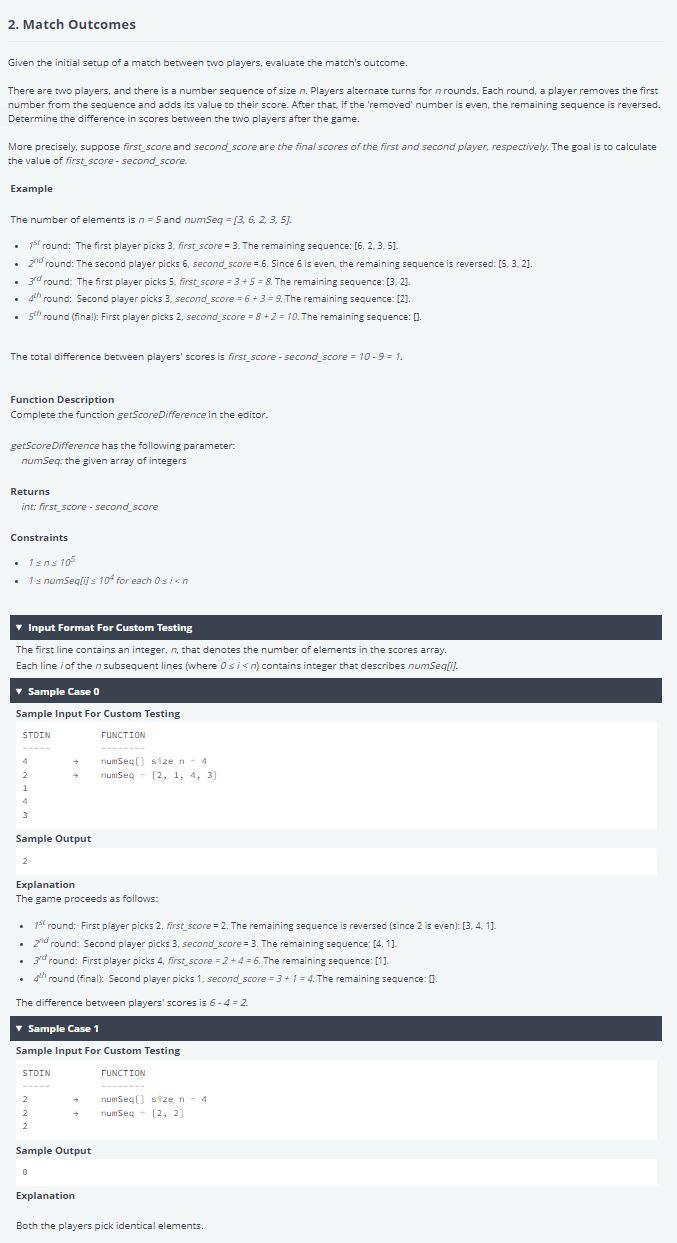Home /
Expert Answers /
Computer Science /
python-3-bin-python3-nbsp-import-nbsp-math-import-nbsp-os-import-nbsp-random-import-nbs-pa956
(Solved): Python 3 #!/bin/python3 import math import os import random import&nbs ...
Python 3
#!/bin/python3
import math
import os
import random
import re
import sys
#
# Complete the 'getScoreDifference' function below.
#
# The function is expected to return an INTEGER.
# The function accepts INTEGER_ARRAY numSeq as parameter.
#
def getScoreDifference(numSeq):
# Write your code here
if __name__ == '__main__':
fptr = open(os.environ['OUTPUT_PATH'], 'w')
numSeq_count = int(input().strip())
numSeq = []
for _ in range(numSeq_count):
numSeq_item = int(input().strip())
numSeq.append(numSeq_item)
result = getScoreDifference(numSeq)
fptr.write(str(result) + '\n')
fptr.close()
Given the initial setup of a match between two players, evaluate the match's outcome. There are two players, and there is a number sequence of size \( n \). Players alternate turns for n rounds. Each round, a player removes the first number from the sequence and adds its value to their score. After that, if the 'removed' number is even, the remaining sequence is reversed. Determine the difference in scores between the two players after the game. More precisely, suppose first_score and second_score are the final scores of the first and second player, respectively. The goal is to calculate the value of first_score - second_score. Example The number of elements is \( \pi=5 \) and numSeq \( =[3,6,2,3,5] \). - \( p^{\text {st }} \) round: The first player picks 3, first_score \( =3 \). The remaining sequence: \( [6,2,3,5] \). - \( 2^{n d} \) round: The second player picks 6 , second_score \( =6 \). Since 6 is even, the remaining sequence is reversed: \( [5,3,2] \). - \( 3^{\text {rd }} \) round: The first player picks 5, first score \( =3+5=8 \). The remaining sequence: \( [3,2] \). - \( 4^{\text {th }} \) round: Second player picks 3, second_score \( =6+3=9 \). The remaining sequence: [2]. - \( 5^{\text {th }} \) round (final): First player picks 2, second_score \( =8+2=10 \). The remaining sequence: []. The total difference between players' scores is first_score - second_score \( =10 \cdot 9=1 \). Function Description Complete the function getscoreDifference in the editor. getScoreDifference has the following parameter: numSeq: the given array of integers Returns int: first_score - second_score Constraints - \( 1 \leq n \leq 10^{5} \) - \( 1 \leq n u m S e q[i] \leq 10^{4} \) for each \( 0 \leq i
Expert Answer
def getScoreDifference(numSeq): user1Score=0 user2Score=0 turn=1 while(len(numSeq)!=0): score=n
